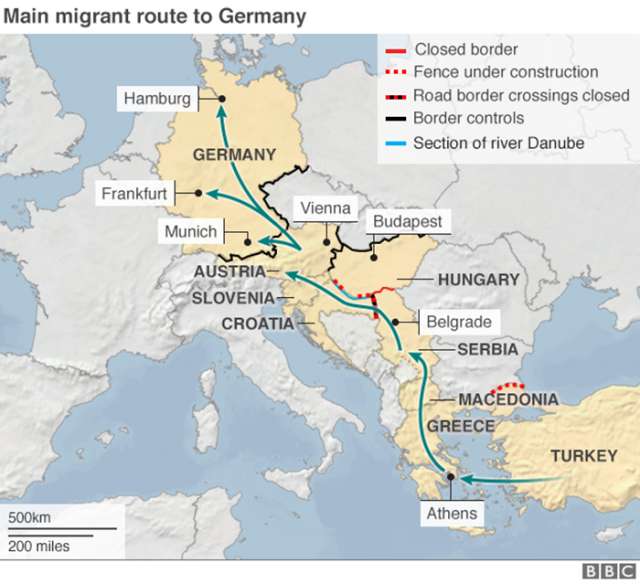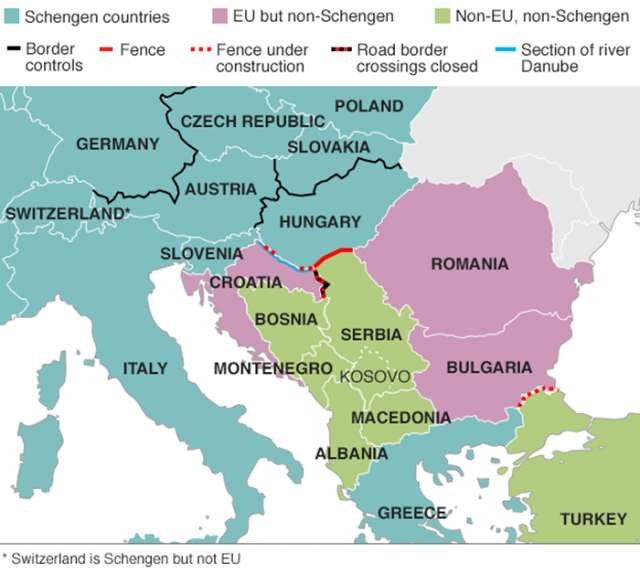Central Europe is the new migrant hotspot.
Why are there tensions between EU neighbours?
Hungary
Hungarian riot police fired water cannon and tear gas at a big crowd of migrants at the border with Serbia on 16 September.
Hungarian officials said bottles and stones had been thrown at police, who were preventing the migrants from pouring through the new border fence.
There is widespread criticism of Hungary for its decision to build the razor-wire fence and prosecute migrants who enter illegally. Many fellow Europeans see the measures as a Draconian over-reaction. But reports indicate that many Hungarians support the government`s tough stance.
Neighbouring Serbia, Croatia and Romania have all criticised Hungary`s policy.
Refugees have a right under international law to get protection and claim asylum. Pushing them back at the border violates that right, aid organisations point out.
Many have fled the conflicts and abuses in Syria, Iraq, Afghanistan and Eritrea. But there are also many economic migrants from the Balkans.
German data for January-August 2015 shows Syrians as the biggest group of asylum seekers (55,587), followed by migrants from Albania, Kosovo and Serbia.
The conservative Hungarian Prime Minister Viktor Orban has said Europe`s Christian heritage is under threat because most of the migrants are Muslims.
He accused Germany of encouraging the influx by welcoming so many migrants and rejected the EU Commission`s proposal for mandatory quotas to distribute 160,000 migrants EU-wide.
This year Hungary became a migrant hotspot because it is in Central Europe and in the Schengen passport-free zone - a gateway for migrants bound for Germany. The route through Greece and the Balkans became very popular because Libya and the sea passage to Italy proved extremely risky.
Croatia
Croatia`s Foreign Minister Vesna Pusic said her country could give asylum to "a few thousand" migrants, but could not accommodate tens of thousands.
Since Hungary sealed off its border with Serbia there has been a surge of migrants entering Croatia. It is the EU`s newest member state - but not yet in Schengen.
Initially Prime Minister Zoran Milanovic said Croatia would let migrants cross its territory. He called Hungary`s policy "harmful and dangerous".
But on 17 September Croatia closed seven of its eight road border crossings with Serbia.
Migrants had earlier forced their way through police lines at Tovarnik station, on the Serbia border. Croatia said more than 13,000 migrants had entered after Hungary prevented migrants crossing its border.
Hungary also plans to fence off sections of its borders with Croatia and Romania, to keep migrants out.
Croats have warned them of the risk of landmines if they venture off the main roads in border areas, where Croat and Serb forces clashed in the early 1990s.
But many migrants are reported to be still entering Croatia across fields, bypassing border controls.
Serbia
Serbs have generally shown tolerance and hospitality towards migrants, the BBC`s Guy Delauney reports.
Serbia is preparing extra facilities now that migrants are likely to spend longer on its territory, unable to reach Hungary.
The country has struggled to cope since migrants flocked in, heading north from Greece. But the authorities are trying to uphold EU standards on human rights, as Serbia is a candidate for EU membership.
Serbia`s Prime Minister Aleksandar Vucic deplored Hungary`s behaviour, calling it "brutal" and "non-European".
Slovenia
Lying between Croatia and Austria, Slovenia expects a new migrant influx because richer northern Europe is acting like a magnet. It is a logical transit country for migrants bypassing Hungary.
Slovenian Prime Minister Miro Cerar said his small Alpine country would stick to the Schengen free movement rules.
Slovenia plans to process asylum requests, but says it will not create a "corridor" for refugees to simply travel on to Austria.
On 17 September, Slovenia suspended rail connections with Croatia.
Romania
Like Croatia, Romania has warned Hungary against building new fences on its borders.
Romania protested to Hungary over its plan, calling Hungary`s language "unacceptable in terms of diplomacy". Foreign Minister Bogdan Aurescu spoke of "an attempt by the Hungarian side to draw us into an artificial conflict".
So far Romania has not been a major migrant transit country, but that could change.
Romania, like most of its East European neighbours, objects to mandatory EU quotas. It is willing to take in a maximum 1,785 migrants in a voluntary quota scheme.
Migration is a very sensitive issue for Romania. For years the country has been trying to join Schengen, but some other EU countries - notably the Netherlands - have blocked that.
In recent years, many poor Roma (Gypsy) have moved from Romania to richer EU countries as economic migrants. But that has caused tensions, especially in France, where squalid, makeshift Roma camps have been torn down by police.
Austria
Migrants have poured into Austria from Hungary, en route to southern Germany. The authorities have not pushed them back.
Austria re-imposed border checks - as did Germany on its border with Austria - as a temporary, emergency measure that is allowed under Schengen rules. Slovakia - on Austria`s eastern border - did so too.
Austria has deployed about 2,200 soldiers to help with logistics, as the migrant influx continues, though they are not acting as border guards.
The crisis has caused major disruption to road and rail travel between Austria and its neighbours. Crowds of migrants have gathered at Vienna`s main stations, waiting for trains to take them north.
The Vienna-Budapest rail service - suspended since 10 September - will reopen on Friday, Austria`s OeBB railways announced.
But rail travel from Salzburg to Germany remains suspended.
In August, the UN and Amnesty International condemned conditions at Austria`s overcrowded Traiskirchen reception centre, south of Vienna, where many migrants were sleeping in the open. Austria has made improvements there.
But the world was shocked when 71 dead migrants were found inside an abandoned lorry near Austria`s border with Hungary.
Germany
Chancellor Angela Merkel says Germany will look after genuine refugees, fulfilling its international humanitarian duty.
There has been an outpouring of sympathy and help for the new arrivals, from many ordinary Germans.
But Germany says its welcome does not extend to economic migrants from outside the EU.

Germany wants to ensure an orderly entry of migrants that includes registering every new arrival. The influx has put huge pressure on some cities, such as Munich, as many migrant hostels are now full.
Germany expects at least 800,000 asylum seekers this year - about four times the number it handled last year. It has urged its EU partners to back mandatory quotas - something that France, Italy and Greece also want.
Mrs Merkel`s Bavarian allies, the CSU, called Berlin`s approach to migration "an unparalleled political error". Other German regional leaders have also criticised the policy.

Germany said it would take in Syrian refugees wherever in the EU they had first arrived. Sweden had earlier announced a similar policy.
It means that the EU`s Dublin Regulation is de facto suspended. That rule says a migrant`s asylum claim should be processed in the European country where he/she first arrives.
















































